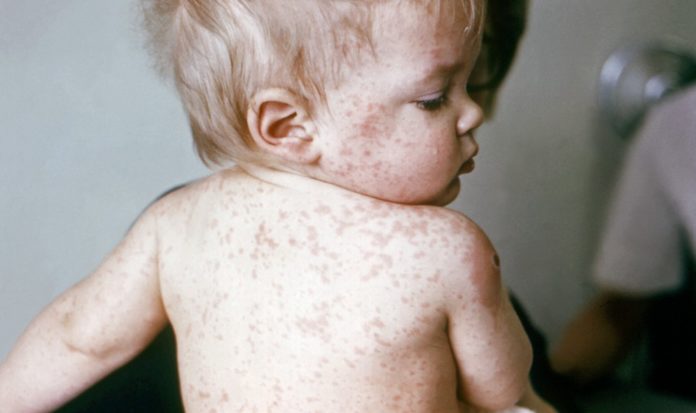
Scientists have long known that the measles virus can temporarily weaken a child’s immune system, making them more vulnerable to a number of other diseases. But instead of this effect lasting 1 or 2 months, a new study finds it could persist for up to 3 years, making children highly vulnerable to other diseases in the process.
“We already knew that measles attacks immune memory, and that it was immunosuppressive for a short amount of time. But this paper suggests that immune suppression lasts much longer than previously suspected,” says study co-author Dr. Jessica Metcalf, assistant professor of ecology and evolutionary biology and public affairs at Princeton University, NJ.
“In other words,” she adds, “if you get measles, 3 years down the road, you could die from something that you would not die from had you not been infected with measles.”
The new research, published in the journal Science, provides further evidence of the life-saving effectiveness of the measles vaccine, demonstrating that the protective benefits could prevent diseases for years to come.
Measles mystery
Before vaccination, measles was responsible for millions of childhood deaths. Today it remains a cause of great illness and death in low-resource countries, killing over 140,000 children worldwide every year.
Where measles vaccines have been introduced, childhood deaths often plummet by as much as 50%. Measles is deadly, but before the vaccines were introduced in 1963, the virus did not directly cause half of all childhood disease deaths. In other words, where measles vaccines have been introduced, they were associated with reductions in more childhood disease deaths than were actually caused by the measles.
The reason for these major drops in mortality has been a central mystery surrounding the vaccine for decades. But with this latest study, researchers have taken a huge step toward further unraveling this mystery.
The study’s lead author, Michael Mina, a postdoctoral research at Princeton, says the work was inspired by a 2012 study that demonstrated strong links between the measles virus and a reduction in immune memory cells in macaque monkeys.
That study showed that the measles virus attacks and destroys T cells, or T lymphocytes — a type of white blood cell in the immune system that protects against diseases by remembering and targeting infectious pathogens that have crossed its path before. But the researchers found that when the T cells built up again about a month later, they didn’t remember the vast array of previously encountered diseases.
Instead, the regenerated cells were primarily aimed at measles alone. Thus, after having the measles, a person might be left with terrific “immune memory” against measles, but with an “immunologic-amnesia” to the rest of the diseases (or vaccines) he or she had previously encountered.
Reduction in measles incidence linked to drop in deaths from other diseases
With that in mind, Mina and his colleagues wanted to determine whether the same process occurs in humans and, if so, how long it takes for the immune system to fully recover and stave off infection after exposure to the measles virus.
For the study, the team conducted a detailed analysis of population data from the U.S., England, Wales and Denmark, investigating death rates and measles incidence among children aged 1-9 in the European countries and among children aged 1-14 in the US during pre- and post-vaccine eras.
After applying a number of different estimates to the data in relation to how long reduced immunity after measles infection may last, the researchers identified a strong correlation between measles incidence and deaths from other diseases following a “lag period” of 28 months — a finding that was consistent across all countries and age groups and in both pre- and post-vaccine eras.
“In other words, reducing measles incidence appears to cause a drop in deaths from other infectious diseases due to indirect effects of measles infection on the human immune system,” explains study co-author Bryan Grenfell, of the Department of Ecology and Evolutionary Biology at Princeton and the Fogarty International Center at the National Institutes of Health. “At the population level, the data suggests that when measles was rampant, it may have led to a reduction in herd immunity against other infectious diseases.”
The case for vaccination grows stronger
Based on their findings, the researchers say it is likely that the measles vaccine protects against measles-related immunologic amnesia, and therefore may confer protection against other diseases. On the other hand, the results also highlight an entirely new threat posed by vaccine refusals.
There is a largely held, but incorrect, belief that measles is associated with little severe illness. This is simply not true. The primary infection can have devastating effects, including high fevers, rash, lung infections and encephalitis. And this latest study suggests that measles infection may also have serious immunologic effects, leaving children vulnerable to secondary infections, that brew under the surface, possibly for years. These secondary infections are no less harmful, and would not occur if not for a measles infection, perhaps even two or three years earlier.
Measles vaccination is perhaps the best buy there is towards keeping society free of disease. Not only does the vaccine prevent against one of the most contagious viruses known to man; it also reduces the circulation of other diseases. When vaccine skeptics are weighing the scales of perceived (yet unfounded) risks of measles vaccination versus risks of the infection itself, these findings should add a new set of weights showing that vaccines are the best option for both the child and the population at large.
Indeed, there are regions today not lucky enough to have access to vaccines and where parents are reminded daily of the damage caused by vaccine-preventable diseases long forgotten in much of the world. In these regions, parents often line the hospital walls for an opportunity to get their child vaccinated.
